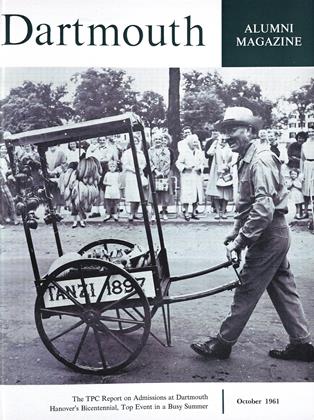IN the report of the TPC Subcommittee on Admissions and Financial Aid the importance of the enrollment program was characterized as follows: "Over and over again in the Committee's deliberations it became apparent that the number one problem, far greater in importance than any other area considered, was the problem of getting the type of boy Dartmouth wants to admit interested enough in the College to apply for admission.... This raises basic problems in how to get the right boys to want to come, how to locate them, how to encourage them to apply."
For more than 35 years Dartmouth has had its applicants interviewed by alumni interviewing committees. While interviews are of inestimable value in giving the Admissions Office information about the candidate and the candidate information about Dartmouth, it became apparent some years ago that more positive action would be required to interest the best students in Dartmouth. The enrollment program represents that positive action, and the National Enrollment Committee, now numbering some 1200 alumni, constitutes an important aspect of this program.
Enrollment has two major aspects; one involves the alumni while the other involves activities which the College can mount directly through its faculty, administrative staff, and public relations program.
Under the aegis of the Alumni Council Committee on Enrollment and Admissions, the National Enrollment Committee functions to interpret Dartmouth College to secondary school students, teachers, and administrators throughout the country. It operates in 75 districts, each under the chairmanship of a National Enrollment Committeeman and each possessing anywhere from one to one hundred school contact men and interviewers. In addition to its long-standing responsibility for interviewing applicants it counsels high school students about Dartmouth and assists them in reaching sound decisions about college choice. When a boy applies to Dartmouth, the Committee members stand ready to help him in any way they can.
Some of the activities which the College undertakes independently or in cooperation with the alumni enrollment organization involve (1) bringing more high school guidance counselors to Hanover to observe at first hand the educational opportunities available here, (2) fostering opportunities for Dartmouth faculty members to meet with secondary school teachers (this can occur either in the school or in professional and academic organizations), (3) developing summer institutes in Hanover for outstanding high school juniors, (4) increasing the number of schools visited each year by College officers, (5) revising and improving Dartmouth literature so as to accurately portray Dartmouth today and fostering the publication of brochures about the programs of each department of the College.
Not all opportunities to increase the contact between the secondary school and the College will be equally successful. Therefore, every possible channel of communication must be explored and utilized. If we concentrate on this, the Dartmouth Story will be heard by secondary school students in ever-increasing numbers and will inevitably increase the number of highly qualified candidates applying to the College.
Secretary, National Enrollment Committee
 View Full Issue
View Full Issue
More From This Issue
-
 Feature
Feature... AND MANY DARTMOUTH YESTERDAYS
October 1961 By Edward Connery Lathem '51 -
 Feature
FeatureWHY a Hopkins Center at Dartmouth?
October 1961 -
 Feature
FeatureWHAT OF ADMISSIONS AT DARTMOUTH?
October 1961 -
 Feature
FeatureADMISSIONS – As Seen at the President's Desk
October 1961 By J.S.D. -
 Feature
FeatureIt Was Summer, Yes, But Quiet... NO
October 1961 -
 Article
ArticleTHE FACULTY
October 1961 By GEORGE O'CONNELL







